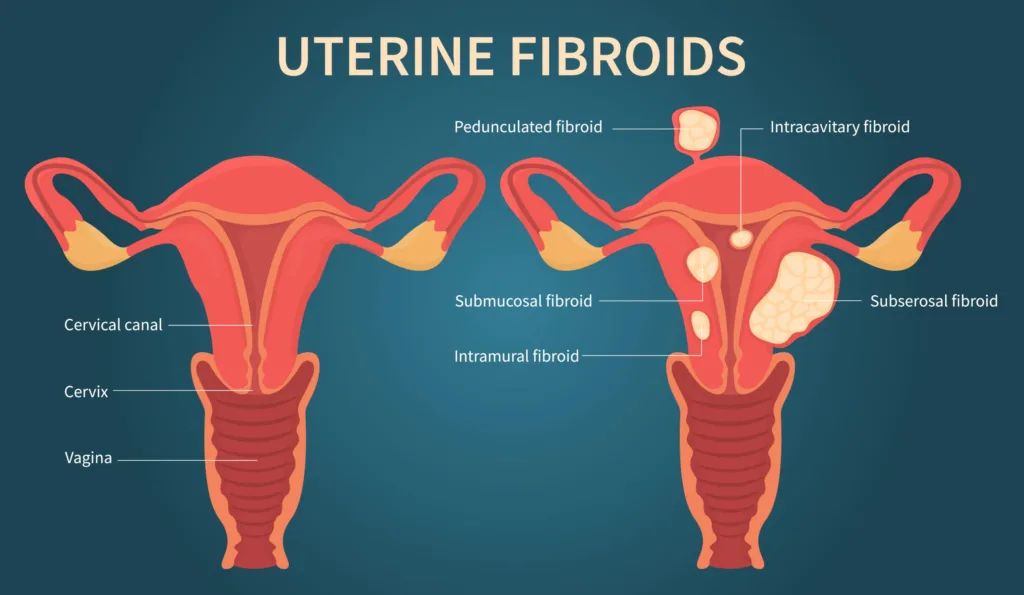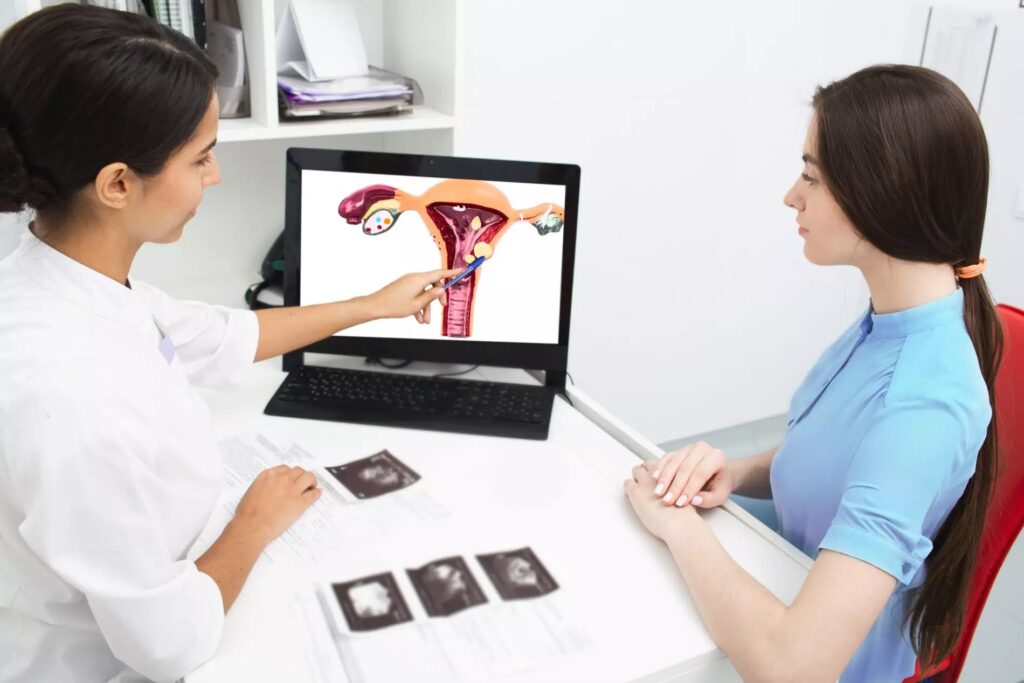Fibroids are a common problem for many women, and they can cause a variety of symptoms. One of the less well-known symptoms is fibroid degeneration smell. In this blog post, we’ll take a closer look at what fibroid degeneration smell is, what causes it, and what you can do about it.
First, let’s define what we mean by fibroid degeneration smell. Fibroid degeneration is a process in which a fibroid, or a non-cancerous growth that develops in the uterus, starts to break down. This can happen for a variety of reasons, such as a lack of blood flow to the fibroid or hormonal changes in the body. When a fibroid degenerates, it can release a foul-smelling discharge.
So, what causes fibroid degeneration smell? As we mentioned, fibroid degeneration can happen for a variety of reasons. In some cases, it may be due to a lack of blood flow to the fibroid, which can cause it to start breaking down. Hormonal changes in the body, such as those that occur during pregnancy or menopause, can also contribute to fibroid degeneration. Additionally, some medical procedures, such as uterine artery embolization, can cause fibroid degeneration.
If you are experiencing fibroid degeneration smell, it’s important to see your healthcare provider. They can determine the cause of the smell and recommend appropriate treatment. In some cases, you may need to have the fibroid removed surgically. In other cases, medication may be prescribed to help manage symptoms.
In addition to seeng your healthcare provider, there are some things you can do at home to help manage fibroid degeneration smell. First, make sure you are practicing good hygiene. This means washing the affected area regularly and wearing clean, breathable clothing. You may also want to use panty liners to help manage any discharge.
Fibroid degeneration smell is a less well-known symptom of fibroids, but it can be a sign that something is wrong. If you are experiencing this symptom, it’s important to see your healthcare provider as soon as possible. With the right treatment, you can manage the symptoms of fibroid degeneration and get back to feeling like yourself again.
The Effects of Uterine Fibroids on Smell
Uterine fibroids, also known as leiomyomas, are noncancerous growths that develop in the uterus. While fibroids themselves do not have a smell, they can cause a foul odor if they becme necrotic or infected. This is because the tissue of the fibroid may break down and create a discharge that has a strong, unpleasant odor. Additionally, if a fibroid grows too large, it can press against other organs and cause issues such as constipation or difficulty urinating, which may also lead to a foul odor. It’s important to note that not all women with fibroids will experience these symptoms, and if you do notice a foul smell or any other unusual symptoms, it’s best to consult with your healthcare provider to determine the underlying cause and appropriate treatment.

Appearance of Fibroid Discharge
Fibroids themselves do not secrete any discharge, but uterine fibroids can case changes in menstrual bleeding patterns that can result in increased or abnormal discharge. The appearance of fibroid discharge can vary depending on the individual and the severity of the fibroids. The discharge may appear watery, pink or brown in color, and may contain small blood clots. It can also be accompanied by abdominal pain, cramping, or discomfort during sexual intercourse. It is important to consult a healthcare provider if you experience any abnormal discharge or other symptoms related to fibroids, as they can be indicative of other gynecologic conditions.
Can Uterine Fibroids Result in a Foul-Smelling Discharge?
Uterine fibroids are noncancerous growths that develop in or around the uterus. While fibroids can cause various symptoms such as heavy bleeding, pelvic pain, and pressure, they typically do not cause a smelly discharge. A smelly discharge is usally associated with bacterial infections or sexually transmitted infections (STIs) such as bacterial vaginosis or trichomoniasis. These infections can cause an overgrowth of bacteria in the vagina, leading to a strong, unpleasant odor. It’s important to note that if you are experiencing a smelly discharge or any other abnormal vaginal symptoms, it’s best to speak with your healthcare provider for an accurate diagnosis and appropriate treatment.
The Sensation of a Degenerating Fibroid
When a fibroid is degenerating, the most common symptom is acute pelvic pain that is focused on the site of the fibroid. This pain is ofen described as sharp and may be accompanied by swelling. The pain can last from a few days to a few weeks, depending on the severity of the degeneration. Other symptoms may include heavy bleeding, fever, and a general feeling of discomfort. It’s important to note that not all women with degenerating fibroids experience pain, and some may not have any symptoms at all. If you suspect you have a degenerating fibroid, it’s important to speak with your doctor to determine the best course of treatment.
Signs of Fibroid Shrinking
Fibroids are noncancerous growths that develop in the uterus. In some cases, they can caue discomfort and heavy bleeding, which may require treatment. There are several signs that indicate fibroids are shrinking. One of the most common signs is a decrease in the overall size of the fibroid, which can be detected through a pelvic exam or imaging tests such as an ultrasound or MRI. Other signs may include fever, vaginal discharge that is watery or pinkish-tinged, sharp abdominal pain or localized pain near the fibroid, dull achy pelvic pain, or an elevated white blood cell count. These symptoms can be a result of the fibroid tissue breaking down, which is a normal part of the shrinkage process. It’s important to note that not all individuals experience the same symptoms and that some may not experience any symptoms at all. If you are experiencing any of these symptoms, it’s important to speak with your healthcare provider to determine the best course of treatment.

Can Fibroids Cause Urine Leakage?
Fibroids can cause urinary incontinence which is the involuntary leakage of urine. This happens when the fibroids grow and press against the bladder, causing it to become overactive and unable to hold urine properly. Urinary incontinence can present as a minor leak when coughing or sneezing, or a more significant loss of control of the bladder. Additionally, fibroids can also cause pressure on the bowel leading to constipation, which may also result in involuntary bowel leakage or “fecal incontinence”. It’s important to note that incontinence can have other causes as well, so it’s aways best to consult with a healthcare professional if you experience any symptoms.
The Color of Blood in Fibroids
Fibroid blood can vary in color depending on how old it is. When the blood passes throgh a fibroid, it may be brown because it has had time to oxidize. This can give the blood a darker appearance. Additionally, as fibroids grow, they can irritate the lining of the uterus, leading to additional bleeding. This bleeding can also range in color, from bright red to brown depending on the age of the blood. It is important to note that if you are experiencing abnormal bleeding or have concerns about fibroids, you should speak with your healthcare provider for proper evaluation and treatment.
Signs and Symptoms of a Burst Fibroid
It is important to note that a burst or ruptured fibroid is a rare occurrence. However, if you have fibroids and are experiencing severe abdominal pain, it is possible that a fibroid has burst. Other symptoms of a ruptured fibroid may include fever, nausea, vomiting, and increased heart rate. In some rare cases, excessive vaginal bleeding may also occur. It is essential to seek immediate medical attention if you experience any of these symptoms. Your healthcare provider may perform an ultrasound or MRI to confirm the presence of a ruptured fibroid and proide appropriate treatment. It is important to maintain regular check-ups with your healthcare provider if you have fibroids to monitor their growth and avoid any potential complications.
The Effects of a Fibroid Coming Out
When a fibroid comes out, it is typically a result of natural expulsion or expulsion after undergoing a Uterine Fibroid Embolization (UFE) procedure. The expelled fibroid may come out as a whole or in pieces, and it is usually accompanied by some vaginal discharge. The vaginal discharge may be present during and after the fibroid expulsion process.
The discharge may vary in color and consistency, and it may be different for each woman. Some women may experience light to heavy bleeding, while others may notice a watery or mucous-like discharge. It is important to note that the discharge may last for a few days or up to a few weeks, depending on the size and location of the fibroid.
It is also common for women to experience cramping and discomfort during the fibroid expulsion process, similar to menstrual cramps. This discomfort should subside after the fibroid has been expelled. However, if the pain is severe or persists, it is important to contact a healthcare provider.
When a fibroid comes out, it is a natural process that can provie relief from symptoms such as heavy bleeding, pain, and pressure. It is important to speak with a healthcare provider about the best treatment options for fibroids and to monitor any post-expulsion symptoms to ensure proper healing.

Do Uterine Polyps Have an Odor?
Uterine polyps can cause a discharge that is foul-smelling. This happens when the polyps become twisted or infected. The discharge may have a strong odor that is noticeable to the person experiencing it. It is important to note that not all uterine polyps will cause a foul-smelling discharge, and other factors could also contribute to abnormal vaginal odor. If you are experiencing abnormal vaginal discharge or odor, it is important to speak with a healthcare provider to determine the underlying cause and appropriate treatment.
The Causes of Bacterial Odor in Vaginal Discharge
The presence of bacteria in the vagina is normal and necessary to maintain a healthy reproductive system. However, an overgrowth of certain types of bacteria can lead to bacterial vaginosis, a common vaginal condition that can cause an unpleasant odor to vaginal discharge. This odor can be descibed as fishy or musty. Bacterial vaginosis can occur due to a variety of factors such as douching, using scented products in the genital area, having multiple sexual partners, and hormonal changes. It is important to seek medical attention if you suspect you have bacterial vaginosis, as it can lead to complications such as pelvic inflammatory disease and an increased risk of sexually transmitted infections.
Does Uterine Tissue Have an Odor?
Uterine tissue can have a slight odor when it is shed during menstruation. This is because menstrual blood consists not only of blood but also of the lining of the uterus and unfertilized eggs. The odor is usually mild and is caused by the combination of these substances and the natural bacterial and acidic environment of the vagina. However, if you notice a strong, unpleasant odor or any signs of infection, such as itching, burning, or discharge, it is important to seek medical attention as it may indicate an underlying issue.
The Risk of Infection from Degenerating Fibroids
Degenerating fibroids can cause infection. When fibroids start to degenerate or break down, they can release bacteria into the bloodstream. This can lead to bacteremia and sepsis, which are severe infections that can be life-threatening if left untreated. Symptoms of infection may include fever, chills, and other systemic signs of infection. If you suspect that you have an infection, it is important to seek medical attention immediately. A doctor can diagnose an infection through a blood culture and provide the appropriate treatment to prevent complications.

The Effects of Fibroid Degeneration on Bleeding
When fibroids degenerate, they can cause bleeding. Fibroid degeneration is a process where the fibroids undergo changes due to a lack of blood supply. When this happens, the fibroids can become inflamed, swollen, and painful. In some cases, fibroids can also cause hemorrhaging or bleeding, which can occur during the normal menstrual cycle or between periods. This bleeding can be heavy and prolonged, and it may require medical attention. If you experience bleeding or other symptoms associated with fibroids, it is important to speak with your healthcare provider to determine the appropriate treatment.
The Effects of Fibroid Shrinkage on Pain Levels
It is possible to feel pain when a fibroid is shrinking. As fibroids degenerate, the cells begin to die and release chemicals that can cause inflammation, swelling, and pain in the abdomen. This pain can range from mild discomfort to severe cramping and can be accompanied by other symptoms such as nausea, fever, and vaginal bleeding. It is important to note that not all women who experience fibroid degeneration will have pain or other symptoms. However, if you are experiencing sudden or severe abdominal pain, it is important to seek medical attention to rule out other underlying conditions.
Conclusion
Fibroid degeneration can cause a foul-smelling discharge if the fibroid outgrows its blood supply and becomes necrotic. This symptom is often accompanied by fever and pelvic pain. However, fibroids themselves don’t secrete any discharge, and they don’t typically cause vaginal discharge like that associated with a yeast infection. If you notice any unusual symptoms related to fibroids, such as heavy bleeding or acute pain, it’s important to speak with your healthcare provider for proper diagnosis and treatment.
